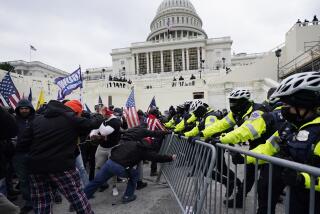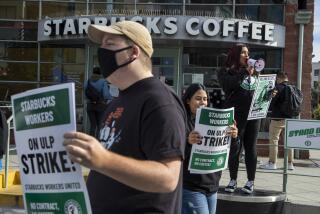Court Limits Food Stamps for Strikers
- Share via
WASHINGTON — The government may limit a family’s eligibility for food stamps when a family member is on strike, the Supreme Court ruled today.
Rejecting unions’ arguments by a 5-3 vote, the justices ruled that a 1981 federal law imposing such limits does not violate any constitutional rights.
The 1981 law, amendments to the Food Stamp Act, generally bars a family from becoming eligible for food stamps at a time when one of its members is on strike. Those families already receiving food stamps when a family member goes on strike are not dropped from the program but are barred from receiving additional food stamps despite the loss of income.
“Exercising the right to strike inevitably risks economic hardship, but we are not inclined to hold that the right of association requires the government to minimize that result by qualifying the strikers for food stamps,” Justice Byron R. White wrote for the court.
He was joined by Chief Justice William H. Rehnquist and Justices John Paul Stevens, Sandra Day O’Connor and Antonin Scalia.
No Rights Violated
The court said the 1981 law does not violate strikers’ freedom of association or their free-speech rights. And the justices rejected an argument that strikers’ equal-protection rights were violated by the 1981 law.
“Union strike funds should be responsible for providing support and benefits to strikers during labor-management disputes,” White said. “It was no part of the purposes of the Food Stamp Act to establish a program that would serve as a weapon in labor disputes.”
But Justice Thurgood Marshall, in a dissenting opinion joined by Justices William J. Brennan and Harry A. Blackmun, said the 1981 amendments amounted to such a weapon.
“The striker amendment under consideration today seems to have precisely that purpose--one admittedly irreconcilable with the legitimate goals of the food stamp program,” Marshall said.
“No other purpose can adequately explain the especially harsh treatment reserved for strikers and their families by the 1981 enactment,” he said.
Supplements Buying Power
The nation’s food stamp program, paid for by the federal government and administered by the states, has supplemented the food-buying power of millions of low-income families since 1964.
Participating households receive food stamp coupons that can be used for food purchases at retail stores. Eligibility for food stamps is based on income and several other factors.
Nearly 21 million people were in households that received food stamps in 1984, and the federal government spent $10 billion on the food stamp program that year.
The 1981 law was challenged by two labor unions, the United Auto Workers and the United Mine Workers, and by some of their members.
A federal trial judge here struck down the law in 1986, sparking the Reagan Administration’s appeal to the Supreme Court.
More to Read
Sign up for Essential California
The most important California stories and recommendations in your inbox every morning.
You may occasionally receive promotional content from the Los Angeles Times.










